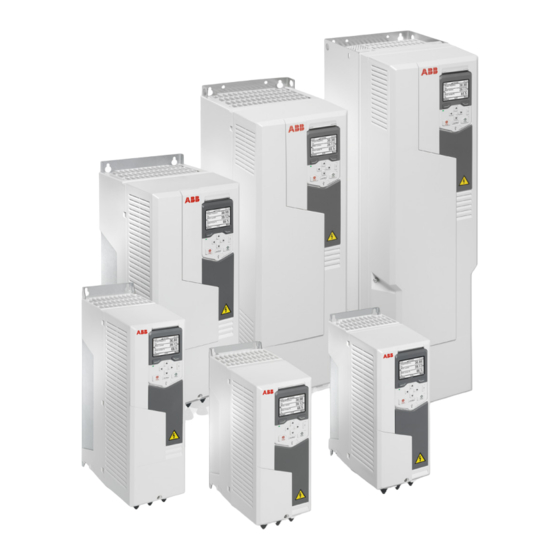ABB ACS580-01 drives Panduan Instalasi dan Start-Up Cepat - Halaman 2
Jelajahi secara online atau unduh pdf Panduan Instalasi dan Start-Up Cepat untuk Unit Kontrol ABB ACS580-01 drives. ABB ACS580-01 drives 17 halaman. Frequency converter. nec types
Juga untuk ABB ACS580-01 drives: Manual (16 halaman), Panduan Instalasi dan Start-Up Cepat (17 halaman)

3. Select the cables and fuses
•
Select the power cables. Obey the local regulations.
•
Input power cable: Use symmetrical shielded cable (VFD cable) for the best EMC performance. NEC installations:
Conduit with continuous conductivity is also allowed and must be grounded on both ends.
•
Motor cable: ABB recommends symmetrically shielded VFD motor cable to reduce bearing current and wear and
stress on motor insulation and to provide the best EMC performance. Although not recommended, conductors
inside continuously conductive conduit are allowed in NEC installations. Ground conduit on both ends.
•
Power cable types: IEC installations: Use copper or aluminum cables (if permitted). Aluminum cables can only be
used for input power cabling in 230 V drives with frame size R5...R8. NEC installations: Use only copper conductors.
•
Current rating: max. load current.
•
Voltage rating (minimum): 600 V AC cable is accepted for up to 500 V AC, 750 VAC cable is accepted for up to 600
V AC, 1000 V AC cable is accepted for up to 690 V AC.
•
Temperature rating: IEC installations: Select a cable rated for at least 70 °C maximum permissible temperature of
conductor in continuous use. NEC installations: Use 75 °C conductors minimum. Insulation temperature can be
higher as long as the ampacity is based on 75 °C conductors.
•
Ratings, fuses and typical power cable sizes
Size: Refer to
power cables
for the maximum cable sizes.
•
Select the control cables. Use double-shielded twisted-pair cable for analog signals. Use double-shielded or single-
shielded cable for the digital, relay and I/O signals. Do not run 24 V and 115/230 V signals in the same cable.
•
Protect the drive and input power cable with the correct fuses. Refer to
4. Examine the installation site
Examine the site where you will install the drive. Make sure that:
•
The installation site is sufficiently ventilated or cooled to remove heat from the drive.
•
The ambient conditions meet the requirements. Refer to
•
The installation surface is as close to vertical as possible and strong enough to support the weight of the drive. Refer to
Weights and free space requirements
•
The installation surface, floor and materials near the drive are not flammable.
•
There is sufficient free space around the drive for cooling, maintenance and operation. For the minimum free space
requirements, refer to
Weights and free space requirements
•
There are no sources of strong magnetic fields such as high-current single-core conductors or contactor coils near the
drive. A strong magnetic field can cause interference or inaccuracy in the operation of the drive.
5. Install the drive on the wall
Select fasteners that comply with local requirements applicable to wall surface materials, drive weight and application.
Prepare the installation site
1.
Make marks with the help of the mounting template. Remove the mounting template before you install the drive on the
wall.
2.
Drill the holes and put anchors or plugs into the holes.
3.
Install the screws. Leave a gap between the screw head and mounting surface.
R1...R4
a
1
R1
R2
mm
in
mm
a
98
3.86
98
3.86
b
317
12.48 417 16.42 473 18.62
c
-
-
-
d >
-
-
-
e >
-
-
-
R5...R9
1
c
× 4
R3
R4
in
mm
in
mm
in
160
6.30
160
6.30
619 24.37 581
-
-
-
-
-
-
-
-
-
-
-
-
-
-
-
for the typical cable sizes and to
Ratings, fuses and typical power cable sizes
Ambient conditions
.
R1...R9
2
× 2
× 4
R5
R6
mm
in
mm
in
mm
612 24.09 571
22.5
623
22.87 531
20.9
583
160
6.30
213
8.4
245
200
7.87
300
11.8
300
100
3.94
155
6.1
155
Terminal data for the
R1...R2: M5 (#10)
R3...R5: M6 (¼")
R6...R9: M8 (5/16")
R7
R8
R9
in
mm
in
mm
24.5
701
27.6
718
23.0
658
25.9
658
9.7
263
10.3
345
11.8
300
11.8
300
6.1
155
6.1
200
2
.
in
28.3
25.9
13.6
11.8
7.9
